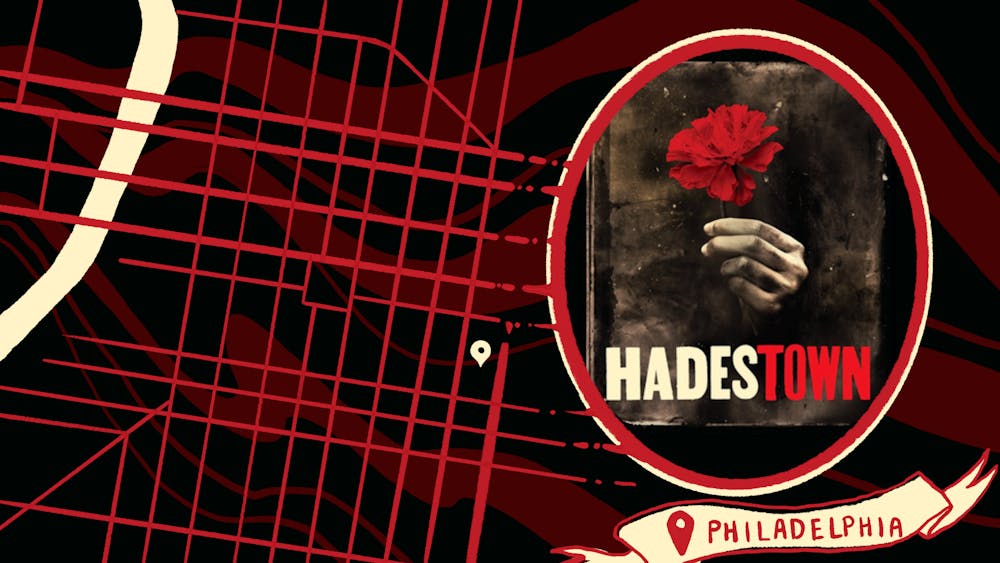"Once upon a time there was a railroad line / Don't ask where, brother, don't ask why / It was the road to Hell / It was hard times"—these seemingly unspirited lyrics are sung in an extremely cheerful, uplifting tone as those singing them clap and dance on the stage. It's a fascinating contradiction.
The 2019 Tony–and–Grammy–award–winning musical Hadestown premiered in Philadelphia at the Academy of Music on February 9th. Written by Anaïs Mitchell and directed by Rachel Chavkin, this Broadway blockbuster revisits the mythic tale of Orpheus and Eurydice.
In ancient Greek mythology, Orpheus, the son of the god Apollo, is known as the most talented singer and poet. His divinely gifted voice can charm every living creature on the earth and unite man with god and with nature. Orpheus falls in love with the human woman Eurydice at first sight and marries her, but happiness doesn't last long—Eurydice is bit by a viper and passes away. Orpheus decides to descend to the underworld to restore her to life. He sings to Hades and moves him. The King of the underworld agrees to Orpheus’s plea, but under one condition: that Eurydice would have to walk behind Orpheus on their way back to the land of the living, and that Orpheus cannot look back at her during this journey. Tragically, Orpheus doesn’t overcome his yearning and eventually looks back, and at that moment his beloved wife disappears.
The musical Hadestown keeps the basic structure and plot of the ancient tragedy but devises the most brilliant method of configuring Hades, the King of the underworld, as the King of mining. Initially, Hades builds the city full of minerals, oil, and gemstones because he fears that his wife Persephone, the goddess of spring growth, will never come back down. To further accumulate wealth to secure his pleasure, he induces people to work for him by granting them a hope of mobility, affluence, freedom, and happiness in the context of a capitalist, industrialized society. Therefore, Hades transcends his mythological role and comes to represent the capitalists who build factories and turn cities into machines of generating profit.
Here, unlike classic versions of the tale, Eurydice voluntarily signs the contract to come down to the underworld. She’s too poor to afford food, and she’s dying. Eurydice joins the people who are preached at every day to work even harder, to build walls to defend properties, and keep themselves free from the ultimate enemy of poverty. Repeating the same work again and again while keeping heads low, "They can hear / But they don't care. No one has a name down here. They can look / But they don't see." Individuals in Hadestown, as the underworld realm is referred to in the play, become alienated components of a mechanized organization. One becomes aloof and comfortably numb under consistent brainwashing and repression, detaching from the real, pleasurable principle of living.
Although it seems that with the money earned through her labor, Eurydice could escape the threat of starving to death, she indeed has entered the world of hell, where there is no pleasure—only suffering. Spring and summer—in which people sing, dance, read poems, and truly live—don't exist in the gloomy Hadestown. There are only fall and winter, when people bustle to get food and clothing to keep alive.
As Orpheus descends to Hadestown to rescue Eurydice, his music and poetry awaken people's memories of spring and joy. It's "A song to fix what's wrong / Take what's broken make it whole." His tunes unite the workers to rebel against Hades and inspire them to find their way out. "Cause he thought no one could hear / But everybody knows that walls have ears / And the workers heard him." The voice of Orpheus does not command, but people listen when he sings. His singing recalls the true meaning of life and happiness that escapes the repression of capitalism, that of spring and of summer, of love and of warmth. His song lets people realize how they have enslaved themselves under a mere illusion of capitalist–defined freedom, and how true freedom should be sought through joy and connection.
Although Orpheus doesn't successfully take his love back nor lead the workers out of Hadestown, this love song, this sad song, this old song, will continue to be sung again and again. Orpheus becomes the alternative cultural hero of the new possibility of freedom from capitalism, and every time he chants, he brings us closer to that dream.







